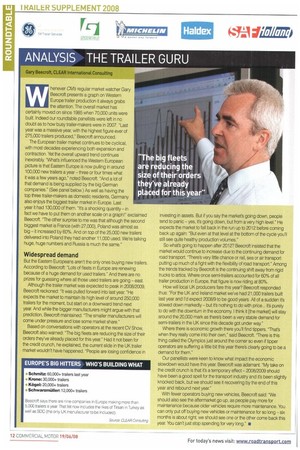ANALYSIS THE TRAILER GURU
Page 70

If you've noticed an error in this article please click here to report it so we can fix it.
1 Gary Beecroft, CLEAR International Consulting henever CM's regular market watcher Gary Beecroft presents a graph on Western Europe trailer production it always grabs the attention. The overall market has certainly moved on since 1985 when 70,000 units were built. Indeed our roundtable panellists were left in no doubt as to how busy trailer-makers were in 2007. "Last year was a massive year, with the highest figure ever of 275,000 trailers produced," Beecroft announced.
The European trailer market continues to be cyclical, with most decades experiencing both expansion and contraction. Yet the overall upward trend continues inexorably. "What's influenced the Western European picture is that Eastern Europe is now pulling in around 100,000 new trailers a year three or four times what it was a few years ago," noted Beecroft. "And a lot of that demand is being supplied by the big German companies." (See panel below,) As well as having the top three trailer-makers as domestic residents, Germany also enjoys the biggest trailer market in Europe. Last year it had 130,000 of them. "It's a shocking quantity in fact we have to put them on another scale on a graph!" exclaimed Beecroft. "The other surprise to me was that although the second biggest market is France (with 27,000), Poland was almost as big it increased by 60%. And on top of the 25,000 new trailers delivered into Poland they had another 11,000 used. We're talking huge, huge numbers and Russia is much the same."
Widespread demand
But the Eastern Europeans aren't the only ones buying new trailers. According to Beecroft: "Lots of fleets in Europe are renewing because of a huge demand for used trailers." And there are no prizes for guessing where all those used trailers are going east.
Although the trailer market was expected to peak in 2008/2009, Beecroft reckoned: It was pulled forward into last year. "He expects the market to maintain its high level of around 250,000 trailers for the moment, but start on a downward trend next year. And while the bigger manufacturers might argue with that prediction, Beecroft maintained: "The smaller manufacturers will come under pressure and lose some market share."
Based on conversations with operators at the recent CV Show, Beecroft also warned: "The big fleets are reducing the size of their orders they've already placed for this year." Had it not been for the credit crunch, he explained, the current slide in the UK trailer market wouldn't have happened. "People are losing confidence in investing in assets. But if you say the market's going down, people tend to panic -yes, it's going down, but from a very high level." He expects the market to fall back in the run up to 2012 before coming back up again: "But even at that level at the bottom of the cycle you'll still see quite healthy production volumes."
So what's going to happen after 2012? Beecroft insisted that the market would continue to increase due to the continuing demand for road transport. "There's very little chance or rail, sea or air transport putting up much of a fight with the flexibility of road transport." Among the trends tracked by Beecroft is the continuing shift away from rigid trucks to artics. Where once semi-trailers accounted for 60% of all trailer production in Europe, that figure is now riding at 80%.
How will local UK producers fare this year'? Beecroft responded thus: "For the UK and Ireland market we've had 21,000 trailers built last year and I'd expect 2008/9 to be good years. All of a sudden it's slowed down markedly but it's nothing to do with price.., it's purely to do with the downturn in the economy. I think it [the market] will stay around the 20,000 mark as there's been a very stable demand for semi-trailers in the UK since this decade got under way."
Where there is economic growth there you'll find tippers. "That's when they really come into their own," said Beecroft. "There is this thing called the Olympics just around the corner so even if tipper operators are suffering a little bit this year there's clearly going to be a demand for them," Our panellists were keen to know what impact the economic slowdown would have this year. Beecroft was adamant. "My take on the credit crunch is that it's a temporary effect 2008/2009 should have been a good spell for the transport industry and ifs been slightly knocked back, but we should see it recovering by the end of this year and rebound next year."
With fewer operators buying new vehicles, Beecroft said: "We should also see the aftermarket go up, as people pay more for maintenance because older vehicles require more maintenance. You can only put off buying new vehicles or maintenance for so long -six months is about right, we should see one or the other come back this year. You can't just stop spending for very long." •
















































































































































































































